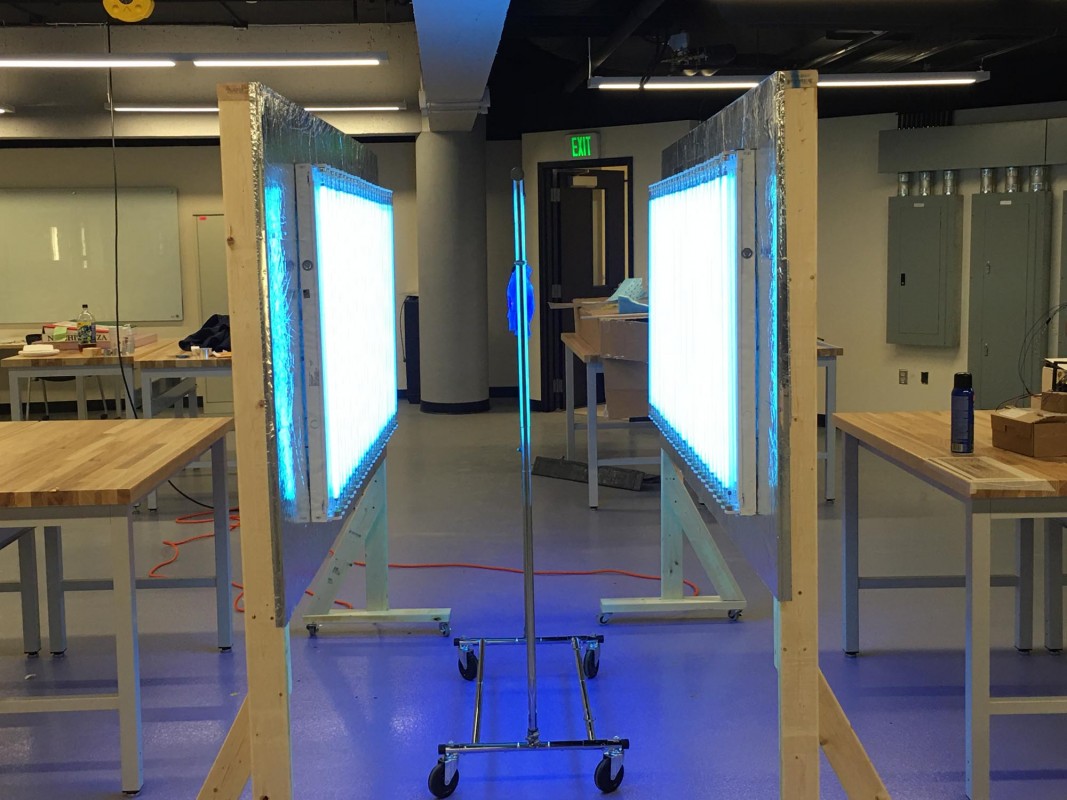Department of Biomedical Engineering steps up to fight COVID-19
Also: Research projects look at heart cells, sweat and more

As the COVID-19 pandemic swept across the globe in early 2020, the Department of Biomedical Engineering at Binghamton University’s Thomas J. Watson School of Engineering and Applied Science dove into research to help solve one aspect of the crisis.
Professor Kaiming Ye, BME department chair, led early efforts — along with Associate Professor Guy German and Assistant Professors Frank Lu and Ying Wang — to build ultraviolet sterilization stations for Greater Binghamton healthcare providers. Schematics for the stations have been shared as far as Mexico and the U.K.’s National Health Service.
Thanks to a one-year, $182,728 NSF RAPID grant titled “UV Station for Sterilizing and Reusing N95 Respirators,” Ye and German will dive deeper into the question of effective UV sterilization against COVID-19 viruses. They will experiment with wavelength, duration and other factors to determine the best treatment.
Various media around the world covered the Watson School’s UV sterilization efforts, including WBNG, WNBF, WICZ, Smart-Lighting.es, PetroTimes and Tekk.tv.
In addition to the research, Watson School Dean Krishnaswami “Hari” Srihari and Ye delivered several thousand disposable gloves, 600 surgical masks, 29 N95 masks and several disposable gowns from Watson School supplies to UHS hospitals as a donation.
Other faculty/staff highlights
Assistant Professor Tracy Hookway received a three-year, $449,629 National Institutes of Health grant so that she and her team can learn more about different cells in the heart, in order to create models that tell us more about how they all function together. Her specialty is 3D tissue engineering and regenerative medicine, and she explores potential therapies utilizing stem cells.
Hookway also took time to explain the importance of the Watson School’s equipment endowment, which helped to purchase new research tools for Watson’s histology lab, where researchers study organic tissues on a microscopic level.
With a recent National Science Foundation grant, an interdisciplinary team of Binghamton University researchers — led by Assistant Professor Ahyeon Koh — is developing a monitor for every aspect of our health using a small electronic patch stuck to the back of the hand. The gizmo would know when users are most stressed, recommend how to improve their diets and keep a close watch for any changes in their body chemistry.
Trisha Gana, the senior assistant to the BME chair, received a Watson Award for Outstanding Staff Service as part of the annual honors for school faculty and staff. Anyone at Watson can nominate someone else, and a committee decides who should get recognition for their good work.
Student achievements
We celebrate our students for their successes!
- Melissa Mendoza won the American Heart Association (AHA) Predoctoral Fellowship.
- Graduate student Yuaho Yuan won a student research award at the 2020 SPIE Photonics West Conference.
- Graduate student Soujanya Sathyanarayana Karanth won the Advanced Biomanufacturing 2020 Graduate Student Research Award.
- Graduate students Rhodesherdeline Limage and Melissa Mendoza won first place in their oral presentation at the 2020 Emerging Researchers National (ERN) Conference.
- Undergraduate student Shuofei Sun won the 2020 Provost’s Undergraduate Research Award.
- Two BME graduate students won the Three-Minute Thesis Competition.
